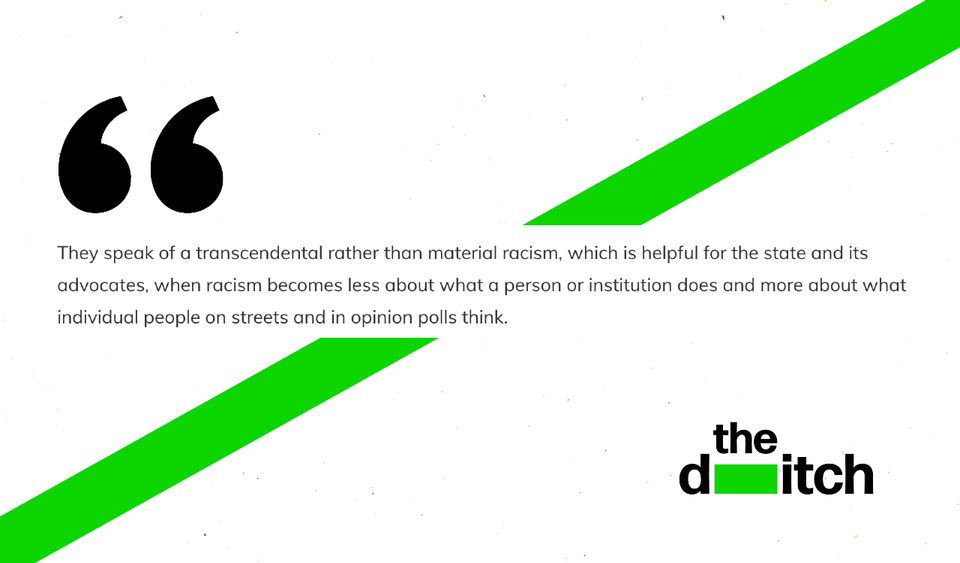“Not far right, just right so far,” is what they say, the Irish ethnonationalists, who seem comfortable with that term, a word that most associate with the far right of the political spectrum. They chant it at their ongoing anti-immigration protests in East Wall to articulate two things: their unease with being called far right and their confidence, unfounded or otherwise, in how mainstream they think their views are becoming. If it appears, to these people at least, that they’ve been right it’s partly because of how members of the Irish establishment have reacted to their agitation.
Government and media may be traitors to the ethnonationalists, who in turn may be distasteful to those in power, but the two groups share more politically than either would like to admit.
Last week Leo Varadkar was in Brussels for a meeting of European Union leaders. He was there, he said, to talk about how EU member states could better protect their borders. “I think when it comes to migration we need to be fair, firm and hard,” he said, after weeks of noisy anti-immigration protests, as well as opinion polls that suggest his constituency is susceptible to the sentiment driving these protests.
Where he said this is important. It’s uncomfortable for people – some people, the people who fly the EU’s sidereal blue and yellow in their online biographies – to confront the inherent exclusivity of the EU, how it’s characterised as much by the people it lets in as by the people it doesn’t. Donald Trump and the people who delivered him the White House blustered about building a wall on the US-Mexican border; the EU has already built its wall, which stands around the perimeter of what’s known as Fortress Europe.
We’re not two months into 2023 and already almost 200 people have died trying to reach Europe via the Mediterranean Sea, according to IOM’s Missing Migrants Project. More than 25,000 people have died or gone missing trying to make the same journey since 2014. These people, many of whom were fleeing war and destitution, would have been encumbered along their way by Fortress Europe – loosely defined as a system comprising Frontex, a European coastguard agency, and the security apparatuses of EU member states, which coalesces primarily around the EU’s Mediterranean borders. Fortress Europe was conceived to stop the wrong kind of people, who happen to be of colour, from entering the EU, and is demonstrably willing to kill them to achieve this end.
This is what Varadkar doesn’t talk about when he talks about not just protecting, but better protecting the EU’s borders, the implication being that maybe more than 200 people should’ve died this year trying to reach Europe. His electorate, when talking about the EU, prefer to consider their own freedom of movement, their years on Erasmus and what they think are the benefits membership of the union has brought Ireland – rather than the methods through which these benefits are provided.
Fine Gael’s voting record on Fortress Europe is clear.
It doesn’t matter whether they’re cynical or sincere
In 2019 the party’s MEPs aligned with their far right allies in the European Parliament, a way of putting it they rejected, to vote against a resolution. This resolution, which asked member states to increase rescue efforts for refugees lost or in danger in the Mediterranean, was defeated by two votes.
Maria Walsh, explaining her vote, said supporting the resolution “would endanger more lives by facilitating, instead of dismantling, the business models of smugglers and human traffickers”. Varadkar in Brussels spoke in similar terms, saying, “We also need to be hard on human traffickers because we should decide who enters our country, not criminal gangs.”
Whether cynical or sincere, it’s an argument that erases the border-trafficker dialectic. Without the former, the kind of militarised border that surrounds the EU, the latter wouldn’t exist – without a fortress that’s killed more than 25,000 people in a little less than a decade, we wouldn’t drive desperate people towards traffickers. Walsh and Varadkar should both know this.
Varadkar’s firm and hard talk on immigration aside, which brought headlines he couldn’t but have expected, he has said he doesn’t want race to become a focus in Irish politics. “None of us in this house want to see the issue of race or migration become centre stage in our politics, most of all somebody like me, given my colour and my family background and the fact I am biracial,” he told the Dáil the day before his Brussels trip. He spoke as the son of an immigrant who now gets to decide which other sons of immigrants get to stay and those who have to leave. Good for him. He looks happy and healthy.
It was an intervention typical of liberals whose words so rarely match their records. They speak of a transcendental rather than material racism, which is helpful for the state and its advocates, when racism becomes less about what a person or institution does and more about what individual people on streets and in opinion polls think.
They have their enablers in media.
Not being able to tell left from right actually makes you smart
The last few weeks have brought us a Newstalk segment in which equality minister Roderic O’Gorman was asked whether Ireland is full, a phrase lifted straight from the ethnonationalist vernacular, along with the Sunday Independent’s publication of Eoin O’Malley’s latest legacy media instalment of I-can’t-tell-the-difference-between-left-and-right-and-this-actually-makes-me-very-smart.
O’Malley, analysing an increasingly vocal Irish far right, came to the conclusion that, actually, the problem is the Irish left, which has unintentionally radicalised its counterparts on the right
“A lot of people who have been fed lines that Irish political leaders are part of ‘the elites in the world, the real elites, in terms of the wealthy, bankers, political representatives’ then start to believe other conspiracy theories,” he wrote, quoting People Before Profit’s Paul Murphy, seeming to take issue with Murphy’s description of the World Economic Forum as a meeting of global elites.
That the forum in Davos is a meeting of international elites isn’t some ‘line’ or conspiracy theory. It should be obvious that these elites, with shared class interests, would want a place to meet and organise. The idea they wouldn’t is implausible. We understand this when it comes to other groups, but people like O’Malley, someone whom academic Michael Parenti would call an “innocence theorist”, don’t accept it for elites. “It’s understood,” said Parenti, “that coal-miners might consciously direct efforts toward advancing their interests, and steel workers and small farmers and school teachers, but not these elites – at least according to the innocence theorist.”
The elites who meet in Davos are the people who’ve given us both Fortress Europe and the assumed leaders who, when encountering ethnonationalists-who-aren’t-far-right-just-right-so-far, defend this fortress and pledge to make it even more hostile.
If they’ve organised, so can the rest of us and though they’re on top, you could say there’s a world still to win. You can just say no, to both groups – the far right and their state allies – as small as that no may seem in the moment.
See youse at the GPO later.


